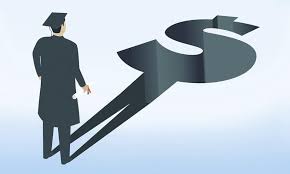|
23A030 Loan Soup by Jim Davies, 7/25/2023

Student Loans, in the US, are a mess. I hesistate even to use "soup" in the title here, because while mixed up with an eclectic variety of veggies and meats, soups are at least tasty and nutritious. The loan program is neither.
Peter Jacobsen noted this month in a FEE newsletter "Last week, the Supreme Court ruled against the Biden administration’s student loan forgiveness proposal which would have forgiven $10,000-$20,000 of student loans per borrower. But the fight for student loan forgiveness isn’t going anywhere." He went on to say that Usurper Joe has plans to get around the SCOTUS prohibition, and at first sight that will make him popular with any graduate with repayments pending. It might reap him several votes, if he's so foolish as to run again.
First off, the name is a poor fit: "forgiveness" is something one may do after a person has done something wrong but apologizes; and the person doing the forgiving is the one who was wronged. That's not what's happening here. In this twisted scene, the borrower may be about to wrong the lender, but a third party - the State - intervenes and says No, I'll force a fourth party, the taxpayer, to pay off the lender and get the borrower off the hook; I'll negate the contract retroactively, at the expense of a new victim.
Second: is college worth it anyway? The value of attending a good college has several elements. Both the costs and the benefits are well analyzed in a NY Fed article from 2014, and the conclusion is stated up-front: it brings about a 15% return on investment, and is therefore well worth it.
The article itself acknowledges however that the whole story is bigger: "part of what we estimate as a benefit to a college degree may reflect the different abilities of those who earn a college degree, and not the added value of a college education itself." Excellent point, and I'd say quite a lot understated, because (aside from the prevalent and absurd racial and other political quotas imposed on college entry criteria) one doesn't enter a good college without strong abilities. So suppose two friends with equal, strong abilities, leave school; one attends Princeton, the other skips college and goes directly into (say) a finance-industry apprentice program and learns on the job. Whose later success will be greater? - the NY Fed does not tell us. It can't.
The whole story is bigger yet. Being a money outfit, the NY Fed can measure only in monetary terms; but in truth there is a value in college life having of social and intellectual interaction among students. This is, or was, actually a major part of what it was all for. The informal and spontaneous gatherings (not always totally sober) deep into the night, of undergraduates studying a variety of subjects, about the meaning of life, the reality of relativity, the elegance of ancient Greek poetry, the causes of the American Revolution, the size of the Universe, the longevity of music and a thousand other topics that spring unbidden into the bright young mind are integral to college life, priceless preparations for later life, and an essential part of the society's culture that they inherit and modify a bit before passing on. How does one measure that in dollars?
That point is amplified by the fact that not everyone sets his or her ambition as that of maximizing his earnings. Two of my friends in college graduated with equally good degrees; one ended up CEO of a large oil company, the other as an ordained minister. Both, I'm sure, felt equally fulfilled in their lives. But their earnings levels were totally different.
Third though, the loan is grossly inflated; that is, the cost of "higher education" is vastly higher than it would be in a free, ie a zero government society. This pumping-up of prices has been going on for decades. Its causes include:
- Schools do less and less to bring students up to the speed required in real life, so the claim is that in order to start a rewarding career one must attend college and get a degree. There is truth in that, but the blame lies heavily on the government school monopoly that produced the shortfall.
- Colleges compete not so much in providing academic excellence but by building impressive structures and sports arenas and attracting athletes talented in their fields but having no particular scholastic ability; that all costs buckets of money and so adds to the fees charged.
- The faculties have moved subjects taught away from science, engineering, math and the classics, towards the latest theories of social work, women's studies and Black history - all in line with what government indoctrinators favor; and since a lot of the tab is picked up by government, guess what: the tune is called by the piper payer.
This is all particularly aggravating now that online learning is so readily done. It would be very easy to offer a degree course to students living at home interacting with other students in virtual, rather than physical classes - yes, even those late night, boozy but mind-expanding sessions discussing topics way outside one's own chosen discipline. The courses could be done at a speed suited to each student and would typically take not 4 years but 3 or 2 or even 1; and the cost would be a tenth of the present ones or less.
So even if all of the fees were paid with the help of a loan, that loan would be closer to $10,000 than $100,000. Quite feasible to pay it off from first-year earnings. Once the dead hand of government is removed, that's how it will be.
|
|


